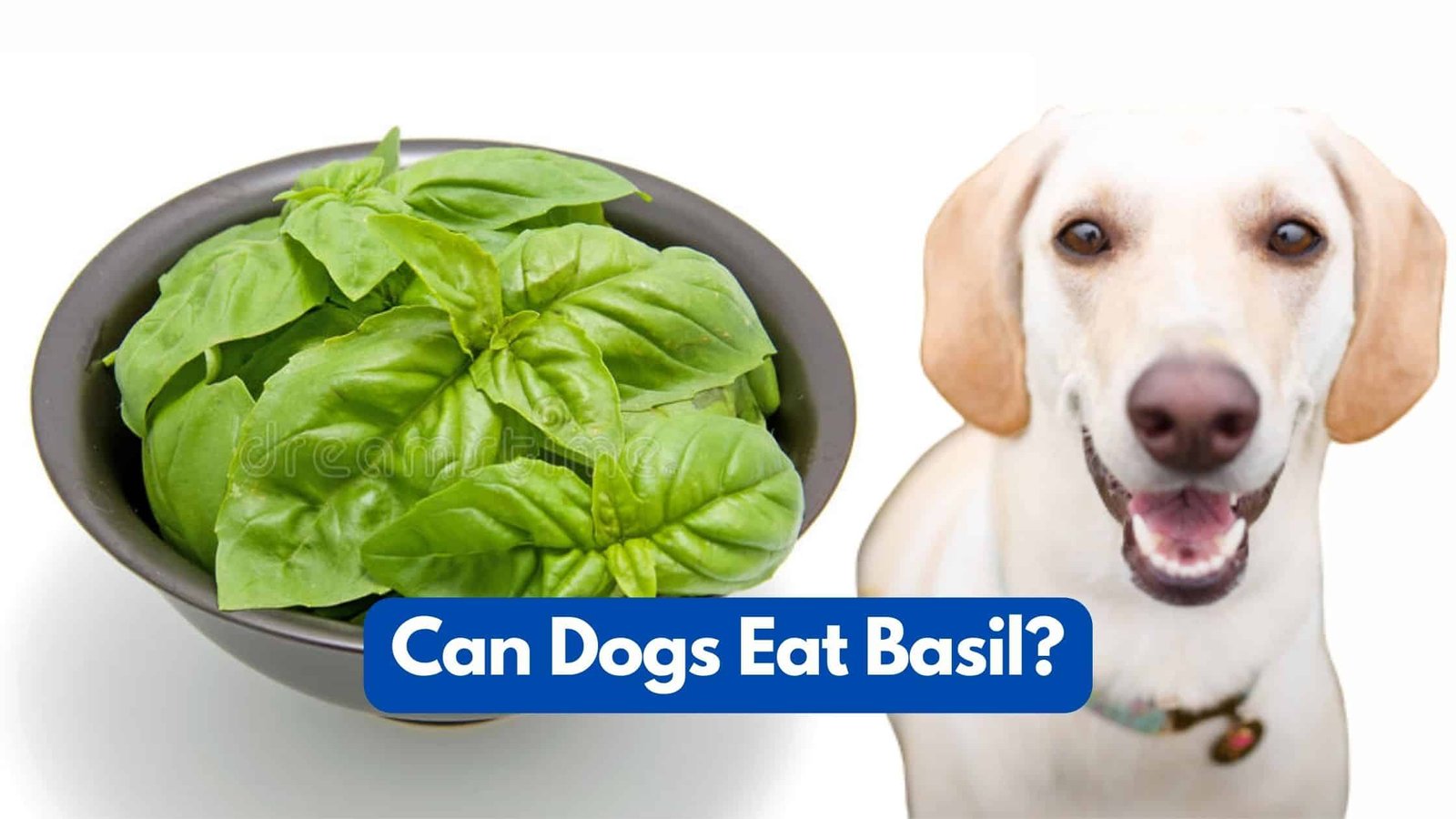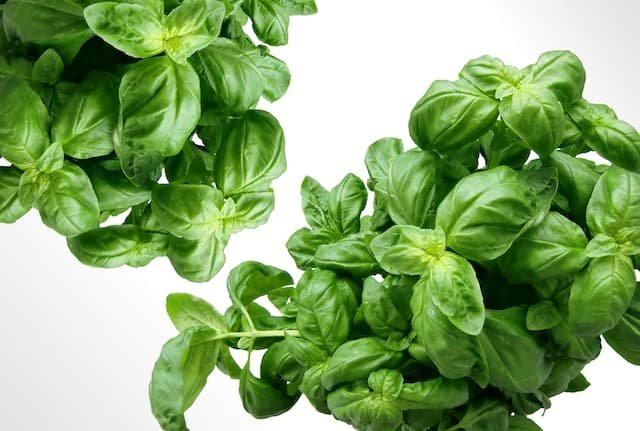Can Dogs Eat Basil? All You Need To Know

When it comes to their dogs’ diet, owners always want the best for their furry friends. As they experiment with different herbs and spices to add flavor to their meals, they may wonder, “Can dogs eat basil?” The good news is that, when given in moderation, basil can be a healthy and safe supplement to a dog’s diet.
Basil is rich in essential vitamins and minerals, which can contribute to the overall health of our canine companions. However, it is important to understand the proper technique for introducing basil and the necessary safety measures.
In this blog post, we will explore the relationship between dogs and basil, including its safety, potential health benefits, possible drawbacks, and creative applications for incorporating this wonderful herb into a dog’s diet. So, let’s find out if basil is a dog-friendly addition to their bowl!
Can Dogs Eat Basil?
Yes, dogs can safely eat basil in moderation. Basil is generally considered non-toxic to dogs and can even provide some health benefits. This flavorful herb contains essential vitamins like A, K, and C, as well as minerals such as calcium and potassium.
Basil also boasts antioxidants that can support your dog’s immune system and promote overall well-being. When introducing basil to your dog’s diet, start with small amounts to ensure they tolerate it well.
Also, avoid using dried basil or any products that contain garlic or onion powder, as these can be harmful to dogs.

Benefits of Feeding Dogs Basil
Feeding dogs basil can offer several potential benefits for their health and well-being. Here are some of the benefits of incorporating basil into a dog’s diet:
- Nutritional Boost: Basil is rich in essential vitamins and minerals, including vitamin K, vitamin A, iron, and calcium. These nutrients can contribute to a dog’s overall health, supporting its immune system, bone strength, and overall vitality.
- Anti-Inflammatory Properties: Basil contains natural compounds that possess anti-inflammatory properties. This can be beneficial for dogs with conditions such as arthritis or inflammatory bowel disease, potentially reducing inflammation and promoting comfort.
- Digestive Support: The aromatic properties of basil can stimulate a dog’s appetite and aid in digestion. It may help alleviate mild digestive discomfort and promote healthy digestion in dogs.
- Antioxidant Effects: Basil contains antioxidants, such as flavonoids and polyphenols, which can help protect cells from damage caused by free radicals. This can contribute to overall cellular health and may have potential long-term benefits for a dog’s well-being.
- Fresh Breath: Basil has natural antimicrobial properties that can help freshen a dog’s breath. Chewing on basil leaves or adding a small amount to their food may help combat bad breath caused by bacteria in the mouth.
- Flavor Enhancement: Adding a touch of basil to a dog’s food can enhance the flavor and aroma, making the meal more appealing. This can be especially helpful for dogs who are picky eaters or have a decreased appetite.
Potential Risks of Giving Basil to Dogs
Feeding dogs basil in moderation is generally safe and can even offer health benefits. However, it’s important to be aware of potential risks associated with feeding dogs basil:
- Digestive Upsets: Some dogs may experience digestive issues such as upset stomach, diarrhea, or vomiting if they consume basil in large quantities or if their system is not accustomed to it. Introduce basil gradually to monitor your dog’s reaction.
- Allergic Reactions: Although rare, some dogs may be allergic to basil. Watch for signs of allergic reactions such as itching, swelling, or difficulty breathing. If any symptoms occur, stop feeding Basil to your dog and consult a veterinarian.
- Toxicity from Seasonings: Basil leaves themselves are not toxic to dogs. However, certain seasonings or preparations that accompany basil, such as garlic or onion, can be harmful or toxic to dogs. Avoid adding any potentially harmful ingredients to the basil when preparing it for your dog.
- Pre-existing Health Conditions: Dogs with certain health conditions, such as kidney problems or digestive sensitivities, may need to avoid or have limited amounts of basil. Consult with your veterinarian to determine if basil is suitable for your dog’s specific health needs.
- Interactions with Medications: Basil may interact with certain medications, particularly those metabolized by the liver. If your dog is on any medications, consult with your veterinarian to ensure there are no potential interactions between the medication and basil.

How to Feed Dogs Basil
When it comes to feeding dogs basil, it’s important to follow these guidelines to ensure their safety and enjoyment:
- Start with Moderation: Introduce basil to your dog’s diet gradually, starting with small amounts. This allows their digestive system to adjust and minimizes the risk of any adverse reactions.
- Choose Fresh Basil: Opt for fresh basil leaves rather than dried ones, as fresh basil retains its nutritional value and natural flavors. Make sure the basil is free from any pesticides or harmful chemicals.
- Wash Thoroughly: Before feeding basil to your dog, wash the leaves thoroughly under running water to remove any dirt, pesticides, or residue that may be present.
- Chop or Puree: Chop the basil leaves into small, manageable pieces or puree them to make it easier for your dog to consume and digest. This also helps release the aromatic compounds, enhancing the flavor.
- Mix with Food: Sprinkle the chopped or pureed basil over your dog’s regular food, whether it’s kibble, wet food, or homemade meals. Gently mix it in to ensure even distribution.
- Monitor for Reactions: After feeding your dog basil for the first time, keep a close eye on them for any signs of digestive upset or allergic reactions. If any negative symptoms occur, withdraw the Basil from your dogs and consult a veterinarian.
- Consider Basil Treats: If your dog enjoys treats, you can explore commercially available dog treats that contain basil as an ingredient. These treats are specifically formulated with dogs’ nutritional needs in mind.
Basil for Dogs with Special Dietary Needs
As a veterinarian, I understand that some dogs have special dietary needs due to various health conditions. Let’s explore how basil can be beneficial for dogs with specific needs, such as allergies, diabetes, and digestive issues.
1. Basil for Dogs with Allergies
If your furry friend has allergies, you may be wondering if basil is a safe choice for them. The good news is that basil is generally well-tolerated by dogs with allergies. It’s a great alternative to common allergenic ingredients and can add a burst of flavor to their meals without triggering any allergic reactions.
However, as with any new food, it’s essential to introduce basil gradually and monitor your dog for any adverse responses. If you have any concerns or if your dog’s allergies are severe, it’s always best to consult with your veterinarian before introducing basil to their diet.
2. Basil for Dogs with Diabetes
For dogs managing diabetes, their diet plays a crucial role in maintaining stable blood sugar levels. The good news is that basil can be a safe addition to their diabetic-friendly meals. Basil is low in carbohydrates and can provide a burst of flavor without significantly affecting blood sugar levels.
However, it’s essential to consider basil as part of a well-balanced diabetic diet, in consultation with your veterinarian. They can guide you on the appropriate portion sizes and the overall dietary management required for your dog’s specific diabetes needs.
3. Basil for Dogs with Digestive Issues
If your furry companion struggles with digestive issues, basil can be a helpful addition to their diet. Basil’s natural properties can aid in digestion and alleviate mild gastrointestinal discomfort. It can provide a soothing effect on the digestive tract and potentially help with issues like gas, bloating, or occasional indigestion.
However, it’s crucial to introduce basil gradually to avoid overwhelming your dog’s digestive system. If your dog has chronic digestive issues or if you notice any adverse reactions to basil, consult with your veterinarian for further guidance.

Alternatives to Basil for Dogs
When it comes to adding flavor and variety to your dog’s meals, there are alternative herbs and spices you can explore. These alternatives can provide similar benefits to basil while offering different tastes and aromas. Here are a few options to consider:
- Parsley: Parsley is a popular herb that can be used as a substitute for basil. It contains vitamins A, C, and K, as well as beneficial antioxidants. Parsley can freshen your dog’s breath and provide a mild flavor boost to your dog’s food.
- Mint: Mint is another herb that can be a refreshing alternative. It has cooling properties and can aid in digestion. Mint leaves can be finely chopped and sprinkled over your dog’s meals for a minty twist.
- Oregano: Oregano is a versatile herb that adds a savory taste to dishes. It contains antioxidants and may have antimicrobial properties. Use dried oregano sparingly, as its flavor can be strong.
- Thyme: Thyme is an herb with a slightly earthy and aromatic flavor. It contains vitamins C and A, as well as antioxidants. Thyme can be added to your dog’s meals in small amounts to enhance the taste.
- Rosemary: Rosemary has a distinct pine-like flavor and aroma. It contains antioxidants and may have anti-inflammatory properties. Use rosemary sparingly, as its strong flavor can overpower other ingredients.
Remember, when introducing alternative herbs and spices, start with small quantities and monitor your dog for any adverse reactions. Adding these alternative herbs can provide variety and sensory enrichment to your dog’s meals, making their dining experience more enjoyable.
However, you should also remember that the primary focus should be on providing a nutritionally balanced diet that meets your dog’s specific requirements.
Frequently Asked Questions Related To “Can Dogs Eat Basil?”
Can dogs eat basil?
Yes, dogs can eat basil in moderation. It can be a safe and healthy addition to their diet.
Is basil toxic to dogs?
No, basil itself is not toxic to dogs. However, certain seasonings or preparations that accompany basil, such as garlic or onion, can be harmful to dogs.
How should I feed basil to my dog?
You can chop or puree fresh basil leaves and mix them into your dog’s food. Start with small amounts and monitor their response.
Can dogs with allergies eat basil?
Basil is generally well-tolerated by dogs with allergies. It can be a safe alternative to allergenic ingredients. However, monitor for any adverse reactions and consult with your veterinarian if needed.
Can dogs with diabetes eat basil?
Yes, dogs with diabetes can eat basil as part of a well-balanced diabetic-friendly diet. Basil is low in carbohydrates and can provide flavor without significantly affecting blood sugar levels.
Are there any risks in feeding dogs basil?
Feeding basil in moderation is generally safe. However, some dogs may experience digestive upsets or allergic reactions. Introduce basil gradually and monitor your dog’s response.
Can puppies eat basil?
Puppies can eat basil in moderation once they are weaned and have started eating solid food. Consult with your veterinarian for specific feeding recommendations for your puppy.
Can senior dogs eat basil?
Yes, senior dogs can eat basil, but it’s important to consider their specific dietary needs and any underlying health conditions. Consult with your veterinarian for personalized advice.
Are there any health benefits to feeding dogs basil?
Yes, basil can provide nutritional benefits and may have anti-inflammatory and digestive-supportive properties. It contains essential vitamins and minerals that can contribute to overall health.
How much basil can I feed my dog?
The amount of basil to feed your dog depends on their size, weight, and overall diet. Start with small amounts and observe your dog’s response. Consult with your veterinarian for specific recommendations.
Conclusion
In conclusion, the question of whether dogs can eat basil has been answered with a resounding “yes.” Basil, when given in moderation and without harmful additives, can be a healthy and flavorful addition to your dog’s diet. It offers nutritional benefits, potential anti-inflammatory properties, and can even freshen their breath.
However, it’s important to remember that every dog is unique, and individual factors such as allergies or specific health conditions should be taken into consideration. As a responsible dog owner, you should always consult with veterinarians to ensure you make the best choices for your furry friend.
So, the next time you’re preparing a meal or looking to add some zest to your dog’s food, consider incorporating a touch of basil. Your dog’s taste buds and health may thank you for it!
Read Other Food Resources
- Can Dogs Eat Blueberry Muffins? The Surprising Truth Revealed
- Can Dogs Eat Jackfruit? Get the Facts Here!
- Can Dogs Eat Mulberries? 6 Awesome Benefits
References:
- Rover – Can My Dog Eat Basil?
- Hepper – Can Dogs Eat Basil?
- Spoiled Hounds – Can Dogs Eat Basil? What You Need To Know





